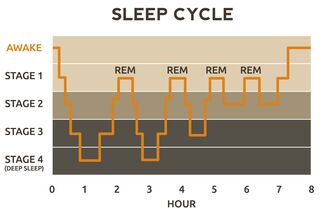Dreaming
How Dreaming Helps the Brain Consolidate Memories
Adult-born neurons in the hippocampus consolidate memories during REM sleep.
Posted June 8, 2020 Reviewed by Lybi Ma
The past century of "sleep and memory" research has established that sleep facilitates the retention of memories in both humans and animals. However, the exact brain mechanisms that help mammals consolidate memories while they sleep was unclear to neuroscientists until recently.
Since the 1950s, neuroscientists have suspected that dreaming facilitates memory consolidation during the rapid-eye-movement (REM) stage of sleep. In 1957, William Dement and Nathaniel Kleitman of the University of Chicago published a landmark study (Dement & Kleitman, 1957) of human adults showing (for the first time) that dreaming occurs during REM sleep.

A few years ago, a study in mice (Boyce et al., 2016) published in the journal Science identified causal evidence that specific theta rhythm brain-wave activity that occurs during REM sleep is necessary for contextual memory consolidation. (See "No. 1 Reason Having Vivid Dreams Benefits Your Brain")
Now, another pioneering study in mice (Kumar et al., 2020) advances our understanding of how specific neurons in the hippocampus called "adult-born neurons" (ABNs) consolidate memories during rapid eye movement sleep. This paper by researchers from the University of Tsukuba and the University of Tokyo in Japan was published online ahead of print on June 4 in the journal Neuron.
"These findings provide a causal link between ABN activity during REM sleep and memory consolidation," first author Deependra Kumar of the University of Tsukuba's International Institute for Integrative Sleep Medicine (IIIS) and co-authors state in the study's abstract.
Last year, a review (Miller & Sahay, 2019) of research relating to the function of adult-born neurons in hippocampal memory published in the journal Nature Neuroscience concluded that the neurogenesis (i.e., "birth of new neurons") in the adult hippocampus "enables the generation of a library of experiences, each registered in mature [ABN] physiology and connectivity."
The neurogenesis of neurons in the hippocampus can occur across the lifespan of most mammals, including mice and humans. However, until now, little was known about the role that adult-born neurons play in consolidating memories during REM sleep. (See "Getting Older Doesn't Stop the Genesis of New Brain Cells")
For their last study (2020) on adult-born neurons, the researchers in Japan used state-of-the-art optogenetic manipulation and calcium imaging to see if ABN activity contributes to memory consolidation during REM sleep in mice.
"We found that young ABNs that were most active during REM sleep after the memory task were most likely to have been active during learning," senior author Masashi Yanagisawa said in a June 5 news release. "Further, when we then examined the effects of optogenetic silencing on young ABN activity during sleep, we found that the consolidation of contextual fear memories was impaired." Professor Yanagisawa is the founder and director of the International Institute for Integrative Sleep Medicine.

The most recent research by Yanagisawa and colleagues suggests that during REM sleep, ABNs undergo synaptic changes that increase their plasticity and enable more robust memory consolidation. Additionally, the unique brain wave oscillations that occur during REM sleep may facilitate synchronization between specific adult-born neurons that are key to memory consolidation.
"This is an important development as the activity and role of ABNs in memory consolidation during sleep was previously unknown, as was the type of hippocampal neuron responsible for memory consolidation during sleep," Yanagisawa and colleagues conclude in the news release.
The recent discovery that adult-born neurons in the hippocampus are necessary for memory consolidation during REM sleep advances our overall understanding of how memories are formed and could lead to new treatments for patients with memory disorders.
Although the latest study on ABNs, REM, and memory consolidation doesn't investigate the link between aerobic exercise and more robust neurogenesis, previous animal and human research has established that cardio workouts are like "Miracle-Gro" for neurons in the hippocampus.
Based on a growing body of evidence, one could speculate that moderate-to-vigorous physical activity (MVPA) or high-intensity interval training (HIIT) may create a win-win for memory consolidation by helping people sleep better and spend more time in REM each night—while also facilitating the birth of more memory consolidating adult-born neurons. (See "High-Intensity Interval Training Boosts Memory Performance")
References
Deependra Kumar, Iyo Koyanagi, Alvaro Carrier-Ruiz, Pablo Vergara, Sakthivel Srinivasan, Yuki Sugaya, Masatoshi Kasuya, Tzong-Shiue Yu, Kaspar E. Vogt, Masafumi Muratani, Takaaki Ohnishi, Sima Singh, Catia M. Teixeira, Yoan Chérasse, Toshie Naoi, Szu-Han Wang, Pimpimon Nondhalee, Boran A.H. Osman, Naoko Kaneko, Kazunobu Sawamoto, Steven G. Kernie, Takeshi Sakurai, Thomas J. McHugh, Masanobu Kano, Masashi Yanagisawa, Masanori Sakaguchi. "Sparse Activity of Hippocampal Adult-Born Neurons During REM Sleep Is Necessary for Memory Consolidation." Neuron (First published online: June 04, 2020) DOI: 10.1016/j.neuron.2020.05.008


